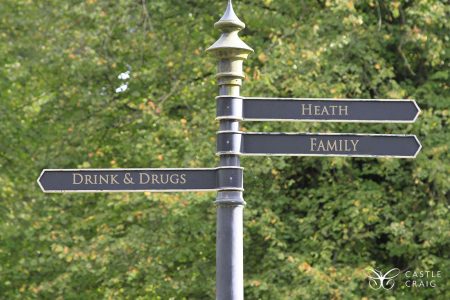Table of Contents
Successful recovery is about changing attitudes and acquiring new habits. The relentless drive of addiction to return means that our new sober lifestyle is often challenged, especially in the crucial first weeks of abstinence. This is the time when relapse is most likely to happen, but it is by no means inevitable – awareness of the dangers and taking due precautions can go a long way to keeping us safe. Finding out what are the most common addiction relapse triggers and how to manage them helps to keep us safe.
What Is Relapse?
Relapse is a return to addictive behaviour of any kind, and it may begin in your mind and your emotions before you actually take the action that ends your sobriety – the lifting of a drink or the placing of a bet. Sobriety should not be seen as a once and for all cure. Like many serious diseases, recovery can be followed by relapse. Vigilance, self-monitoring and honest awareness of our behaviour are vital if we are to keep addiction at bay.
Yet many do not relapse, especially those who are prepared to go to any lengths to retain their hard-won goal of sobriety. One of the best prevention techniques is to identify your personal relapse triggers and draw up a detailed plan to overcome them. Thinking ahead may seem an obvious solution but it must be done thoroughly and without compromise because addiction is cunning, baffling and powerful – as we know.
Triggers – Everyone Is Different
Although some relapse triggers are probably common to nearly everyone – going to a pub with drinking friends for example, for an alcoholic – there may be other more subtle prompts that are unique to only a few. Perhaps you always smoked a joint after a particularly difficult but repetitive aspect of your work or you always bet heavily on the Grand National. Clearly, such moments must be treated in future with careful planning.
There Are Many Types of Triggers
If you have been involved in active addiction for a long time, then in one sense, a great many things are likely to trigger thoughts of using because so much of your past life was built around your addiction. For some people that meant that everyday things like opening the mail or making a phone call could not be done without the crutch of their substance of choice. If so, then in early recovery you need to be super vigilant but, once you have faced life’s everyday challenges in sobriety, you will gain confidence from the experience.
List the Triggers That Affect You Most
Ask yourself what makes you most uncomfortable – is it certain feelings, certain thoughts or memories or is it events, people, places and things that can knock you off balance? These are all potential triggers. Make a list of those likely to affect you the most. Almost all triggers fall under one or more of the headings of Emotional, Mental, Social, Family, Environment, Financial or Special events. The well-known acronym HALT identifies Hungry, Angry, Lonely and Tired as the main dangers to relapse but there are others, as explained in more detail below.
Emotional Relapse Triggers
Any kind of strong emotion such as anger, grief or anxiety can throw us off balance and cause stress or depression. If we have learnt in the past to use addictive behaviour to cope with this, then such feelings in early recovery can be especially dangerous. Traumatic events that cause extreme emotions are particularly painful when recalled and may need to be addressed by special therapy. Additionally, people with a history of serious depression may need extra help dealing with this in sobriety.
Mental Relapse Triggers
The disease of addiction often shows itself in our thought processes – in cravings, obsessional thinking about addictive behaviour and rationalising or minimising the seriousness of the situation. For example, if we see people enjoying a beer on a sunny day, we may inevitably start wanting to do the same. The danger comes if we allow such thoughts to stay in our heads as a nice idea rather than reminding ourselves how it would all end badly. Remember that cravings can come from boredom just as easily as from stress – make sure you have things to do.

Download Our Brochure
Social Relapse Triggers
Much addictive behaviour, especially drinking and some drug use has been described as a ‘tribal’ activity meaning that our society pressures us to conform and if we do not indulge in the same way, we will feel excluded and lonely. Being around friends or acquaintances who are drinking or using in either an enjoyable or negative way can be a powerful relapse trigger.
Recovery, especially the early days, may therefore require us to detach from our original ‘tribe’ and join a new sober group. This may not necessarily be for life but certainly until our new habits are strong enough to cope with dangerous peer pressures. Fortunately for us, there are plenty of healthy alternatives to choose from.
Family Relapse Triggers
One of the most difficult aspects of recovery is the handling of close relationships with loved ones. Family dynamics are usually deeply entrenched with everyone playing roles that follow agendas that do not prioritise you and your recovery. Even the most loving families may not understand the needs of a newly recovering person and any kind of conflict is especially painful when between people who basically love each other.
For example, an alcoholic returning home after rehab may be upset that a spouse still wants to drink and this can lead to dangerous arguments. The importance of family therapy cannot be stressed enough.
Environmental Triggers
Quitting addiction makes us see things around us differently from before. Familiar places such as a pub, restaurant or racetrack now need to be considered carefully before they are approached, social events must be thought through in advance and even tv advertising and social media should be viewed in a different light.
The world around us is large and wonderful but the fact is that most people (apart from your nearest and dearest) do not care about your recovery – they have their own problems and priorities. We can easily be upset by the power and ubiquity of negative pressures in the world around us unless we understand that recovery is our responsibility alone – we must run our lives with this as our priority.
Financial Triggers
Addiction often results in financial problems – debt or other financial instability can trigger relapse in individuals with addiction. It is important to seek practical help and make a plan for financial management. This is especially important for those with gambling addictions who may be tempted to revert to gambling as a way to cope or try to recover their losses.
Conversely, even a sudden influx of money, such as receiving a large inheritance or winning the lottery, can also be a trigger for relapse. The availability of excess funds may lead to euphoria and impulsive spending on addictive substances or other behaviours. For instance, someone in recovery from a shopping addiction may relapse and engage in excessive shopping sprees after receiving a financial windfall.
Special events
Functions such as birthdays, weddings, or funerals, can trigger relapse due to the social pressure to celebrate with alcohol or other substances and the likely high levels of emotion. use. Dates associated with significant painful or happy events, such as the anniversary of a loved one’s death, can be triggering and lead to relapse.
High-stress events such as exams, presentations, or work-related events, can also be dangerous because we can’t rely on our old coping strategies anymore. Facing the fear and doing it anyway is very scary the first time but becomes easier, and having a good support system is vital.
It’s important to note that addiction relapse triggers can vary from person to person, and identifying and managing these triggers is a crucial part of the recovery process. Building a strong support system, thinking ahead and developing healthy coping mechanisms, and seeking professional help when needed can all be beneficial in managing and mitigating these potentially dangerous situations.
Dealing With Relapse Triggers
Successful recovery restores balance and this is achieved by learning new ways of living. Relapse may seem like a lion lurking in the bushes, ready to pounce but actually, the relapse process begins inside ourselves. At Castle Craig, we recognise this and through our Relapse Prevention Course and Family Programme we address the dangers of relapsing in early recovery by teaching new attitudes, insights and practical techniques. We stress the need to put recovery first in all things and never to be complacent. We emphasise the following:
Relapse Is a Process
Relapse begins with emotions. When we become upset, our thinking soon changes and if we fail to remedy this, we can become unhappy, stressed and desperate, perhaps without being fully aware of what is happening. For example, a family argument might leave us feeling insufficiently appreciated and angry resulting in thoughts of drinking which we eventually act out, unless we do something to bring us back to reality. Steps we should take to prevent relapse include:
- Daily self-check – what can I do for my recovery today? What possible dangers to my sobriety do I foresee today? What will I do to address them?
- List potential dangers to my sobriety – people, places, and things. Who will I contact for help if things get difficult?
- Cravings – remember there are techniques to change your thoughts of using – make a phone call, count the number of people in the room, or imagine the disastrous outcome of picking up a drink.
- Network – keep in touch with right-minded people – their experience, understanding, and example are invaluable.
I am here for Alcohol | Drugs | Other Addiction



